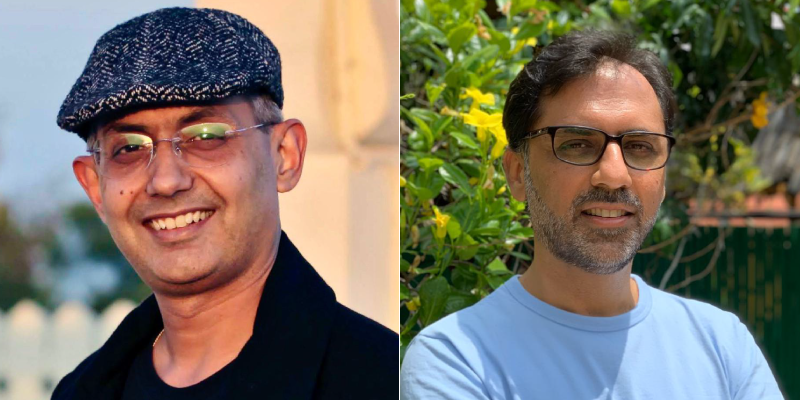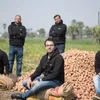Like every techie, Pranav Tiwari and Dhruv Sawhney had one dream: solving and simplifying a large problem using technology.
In their previous avatars, the duo had built and scaled large products. Pranav was the Head of Engineering for Ola, and worked for the likes of Cisco, Cellworks, and Google, building and scaling multiple products.
Dhruv worked in diverse sectors prior to founding WOTU (now Hyperpure, acquired by Zomato). He had also worked for PayPal and Dell.
Keen to solve the next big problem, the duo decided on agriculture, which continues to play a vital role in India’s economy. In 2020, they founded Bengaluru-based agritech startup nurture.farm.
“The opportunity to take an old school industry and transform it with technology is vast,” Pranav says. Nurture.farm offers tech-driven solutions for every step of the farming lifecycle: inputs, machines, advisory, markets, finance, and social.

Pranav Tiwari and Dhruv Sawhney
What does the platform do?
Nurture.farm aims to partner with farmers to bring technology, mechanisation, and digitisation to farming. Each of these plays a role in boosting value addition across the value chain — from inputs to farming practices and markets.
Dhruv says the idea is to improve farmers’ livelihood and make agriculture sustainable by “delivering higher yields and incomes, and reducing risks”. This is done focussing on sustainable practices that help the land and ecosystem.
The agritech startup aims to create value through the entire crop lifecycle. This includes preparation, input, enablement, and output.
“Once farmers sign up, they get an end-to-end basket of services such as inputs, infrastructure, advisory, financial services, and even market linkage,” Pranav says.
The Nurture.farm platform offers services and products as bundles, which each farmer can choose to adopt for every stage of his crop’s lifecycle. The products and services are provided through a digitised platform.
“Farming is suffering from challenges of declining net returns. Bringing modern practices to farming at a positive return for investment is the only way to ensure future food safety. We expect to be able to help the ecosystem by adding value to the entire crop lifecycle, from crop planning to markets,” Pranav says.
The platform informs and provides farmers with what they would need as a package for a particular crop at different stages.
Interventions needed on the farm, be it spring or harvesting services, are digitised and deployed. All infrastructure as a service is made available to the farmer. The platform also provides information, knowledge, and new technology intervention.
Nurture.farm has partnered with OEMs to manufacture machineries, but the machines are designed by the startup.
The team is now building crop packages with a practice module, defining what needs to be done during the calendar to ensure better yields.
Partnerships and tie-ups
Nurture.farm is working in partnership with agriculture solutions company UPL, which also has a stake in the agritech startup. It is currently making use of UPL’s distribution chain, network, reach, and capital.
The team has started by deploying large-scale machinery and pumps, which are offered as a service when a farmer comes to purchase a product on UPL. This provides the farmer with better machinery, products, and services to boost yield.
Dhruv says the startup provides “more predictable and sustainable livelihood with better yield and better prices while lowering costs per acre”. “Also, farmers can focus on producing higher quality and standard crops that can fetch a higher price and boost exports.”
The spread of COVID-19 has spotlighted the need to use technology to disrupt the farming community and the agriculture market.
“COVID is a reminder that we, as humans, have a lot to do when it comes to taking care of our earth and environment for a sustainable life on this planet. Agriculture is at the heart of ensuring food safety for all of us, and deploying technologies of precision agriculture is essential for responsible use of our resources. This is at the centre of what we plan to do,” Pranav says.
He adds that coronavirus has accelerated the need to create better connectivity for farmers in remote areas, and bring to them products and services with the same ease and convenience as people in urban settings. Focus on solving farm-level issues through better advisory, weather alerts, and access to products and services, has become an essential value proposition.
Why agritech?
Dhruv says despite the fact that agriculture is so vital in India, there is no traceability on quality of food, the supply chain is broken, and there are farmer suicides. These pain points led Dhruv to start WOTU, now Hyperpure, in 2017 to ensure transparency and visibility.
“My mistake then was to go into every possible food category. This meant I went wide rather than deep. But it did benefit the industry. The learning from that one intervention made me realise that the agritech space needs multiple interventions to come together holistically,” Dhruv adds.
However, the duo did not immediately start nurture.farm. Prior to starting up, Pranav was looking at different ideas.
“I had built and understood the mobility problem. At Ola, I had got a sense of building for scale. And I wanted to look at a large problem where technology would be a lever. Agriculture is one of the spaces where technology, especially digital technology, has been nearly absent, and I believe there's a lot of work to do here,” Pranav says.
Meanwhile, Dhruv had joined GoJek in Indonesia, as they were looking to build out a Hyperpure equivalent in Southeast Asia. The duo met at the end of November 2019, they were connected through common connections, and found that they shared a common passion and goal.
At that point, nurture.farm was still an idea in the mind of UPL, which was looking to build an ecosystem of services and offerings for farmers.
“Foodtech gave me insights into the market linkage side of the agri/food supply chain. This was a great opportunity to extend those learnings to pre-harvest, all the way from seed to fork. Building a sustainable ecosystem for agriculture cannot happen with only a single intervention. It requires a comprehensive approach,” Dhruv says.
Market and the future
Currently, in the pre-revenue stage, nurture.farm team is looking at a subscription model. The team is currently working with UPL’s farmer base of over 10 lakh farmers across India.
The sector was valued at Rs 18.55 lakh crore in 2019, and is estimated to grow by 10.2 percent until 2024. Nearly 60 percent of India's population is dependent on agriculture for sustenance, according to IBEF.
Startups in the agritech space include Ninjacart, Harabaag, Technifybiz, Fresh VnF, Ecozen, CroFarm, Farmpal, and Agribazaar.
Speaking of the future, Pranav says, “We intend to partner with farmers in bringing technology, mechanisation, and digitisation to farming, each of which plays a role in boosting value addition in the whole value chain - from inputs to farming practices to markets.”
(Edited by Teja Lele Desai)
Want to make your startup journey smooth? YS Education brings a comprehensive Funding and Startup Course. Learn from India's top investors and entrepreneurs. Click here to know more.
Link : https://yourstory.com/2020/06/ola-zomato-hyperpure-execs-agritech-startup-nurture-farm
Author :- Sindhu Kashyaap ( )
June 07, 2020 at 05:15AM
YourStory

1564671114666.png?fm=png&auto=format&h=100&w=100&crop=entropy&fit=crop)
